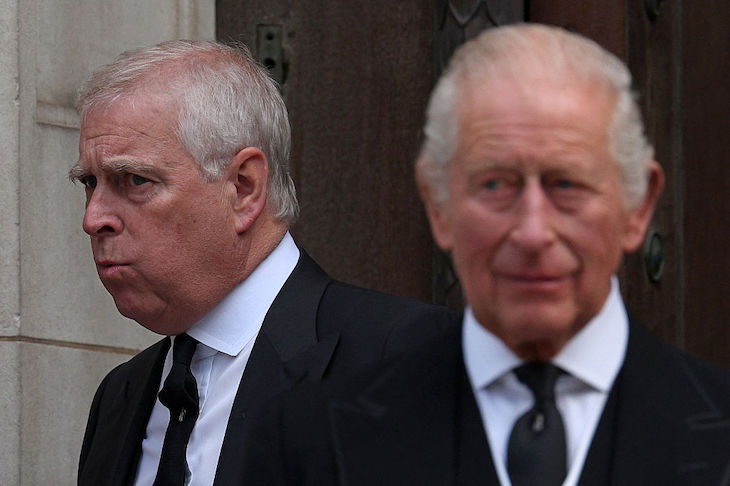Andrew Mountbatten Windsor will no doubt be feeling sorry for himself this morning. Stripped of his royal title and booted out of his Windsor mansion, Andrew probably feels that he has paid an unjust price following the Virginia Giuffre scandal. Indeed, King Charles’ defenestration of his disgraced brother is being described across the world as ‘unprecedented’. The truth is that Andrew should count himself very lucky indeed. Had he been born in a different era, his downfall might have been far more complete.
These punishments make the penalties suffered by Mr Mountbatten Windsor – who will now see out his days in a nice house in Sandringham – seem mild
Even a cursory glance at Britain’s Royal history reveals multiple instances of fraternal family clashes, resulting in banishment or even death. These punishments make the penalties suffered by Mr Mountbatten Windsor – who will now see out his days in a nice house in Sandringham – seem rather mild.
Let’s start with 1066 and all that. Robert ‘Curthose’ was the eldest of William the Conqueror’s three sons, but gained nothing from his father’s conquest of England. Instead he remained as Duke of Normandy plotting against his brothers William and Henry. When Henry became King Henry I, he tired of his big brother’s intrigues, defeated Robert at the Battle of Tinchebray in 1106, and imprisoned him for the rest of Robert’s long life, which ended in 1134.
King Henry II’s relations with his sons were notoriously fraught, with the family feuds culminating in actual armed conflict. His two elder sons Henry ‘the young king’ and Geoffrey repeatedly rebelled against their father. When the third son Richard the Lionheart revolted as well, Henry gave up the struggle and died. The youngest son, John, famously resented Richard inheriting the throne, and delayed collecting a ransom to free his brother when Richard was imprisoned in Austria while returning from the Third Crusade.
The 15th century Wars of the Roses were a family struggle between two branches of the Plantagenet dynasty. But when one branch – the House of York – got the upper hand, the two heads of the family, Edward IV and his brother George, the unstable Duke of Clarence, lethally quarrelled. Clarence plotted to bring down his brother and joined the rival House of Lancaster in rising against him. Clarence finally ‘re-ratted’ and rejoined his brother, but Edward never trusted him again. Famously, he had him drowned in a butt of Malmsley wine in the Tower of London. Whatever Charles’s issues with Andrew, the ex prince is unlikely to share his distant ancestor’s liquid fate.
Family fallouts weren’t only confined to male Royals: Queen Mary Tudor imprisoned her half sister Elizabeth in the Tower on suspicion of plotting against her; and Elizabeth was lucky to escape the sword that had ended the life of her mother Anne Boleyn in the same fortress, on the orders of her father Henry VIII.
King Charles II, like his contemporary namesake, had a troublesome younger brother: James – (who like Andrew had held the title Duke of York). When James converted to Catholicism, the Protestant Parliament moved to exclude him from succeeding his brother on the throne, forcing Charles to send James into exile. The ‘exclusion crisis’ was eventually resolved by the king, and James duly inherited the crown – only to be dethroned by the Protestant ‘glorious revolution’ of 1690.
The Hanoverian dynasty which succeeded the Stuarts at the beginning of the 18th century was notorious for its constant familial rows. George I imprisoned his wife and loathed his son George II. George III disliked his father and detested his son George IV. And the disgraceful behaviour of George IV and his Royal brothers, with their sexual, alcoholic, and gastronomic excesses, and their tribes of illegitimate children, brought the reputation of the monarchy to a new low, from which it was only rescued by the long, respectable reign of Queen Victoria.
Victoria disliked and disapproved of her lecherous eldest son Edward VII with his multiple mistresses. And Edward’s eldest son Albert Victor, aka ‘prince Eddie’ was implicated in a police raid on a homosexual brothel, the ‘Cleveland Street Scandal’. Fortunately for the monarchy’s reputation Eddie died before his father. The throne went instead to the straight-laced George V.
Scandal next engulfed the Royal Family in 1936 when George’s eldest son Edward VIII abdicated to marry an American adventuress Wallis Simpson. The Abdication caused a rift between Edward and his brother George VI who hadn’t bargained in becoming king, and was ill prepared for the role. A younger brother, the bisexual Duke of Kent, had a cocaine habit, but the discretion of the Press in those days kept his partying out of the public gaze.
Elizabeth II emulated her great great grandmother Victoria with her long and respectable reign. But, sadly, Andrew is anything but a chip off the old block. King Charles’s decision to give Andrew the boot seemed inevitable, given the endless bad headlines involving his younger brother. Yet while Andrew will be feeling aggrieved at his treatment at the hands of the King, the reality is that he has had a very lucky escape indeed.







Comments